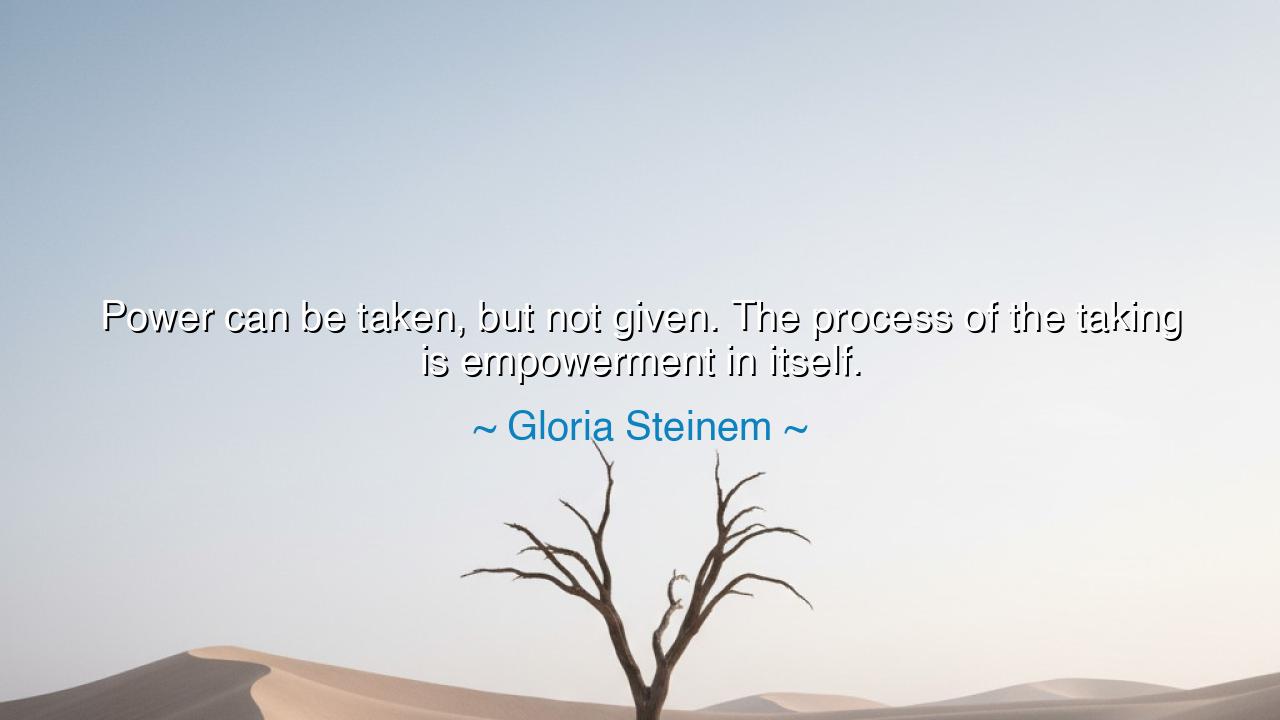
Power can be taken, but not given. The process of the taking is






“Power can be taken, but not given. The process of the taking is empowerment in itself.” These words from Gloria Steinem ring with the weight of ages, echoing the timeless truth that power is not a gift bestowed upon the meek, but something that must be seized, grasped with both hands, and held firmly. It is not handed down by those in authority, but rises from within, from the courage to claim one’s rightful place in the world. The act of taking power — of asserting oneself against the forces that seek to suppress — is a transformative act that shapes the very soul of the one who dares to do so.
In the ancient world, the great warriors and rulers did not wait for power to be offered to them; they took it. The mighty Alexander the Great, for example, did not sit idly by and wait for a crown to be placed upon his head. He fought battles, conquered empires, and by his own will, he carved his name into the annals of history. His rise was not one of passive waiting, but of active conquest — a taking of what was deemed unattainable, and in that very act, he was transformed into a living legend. Power, in his hands, became a force that reshaped the world, and in the act of taking it, he was empowered.
Consider the story of Joan of Arc, who, as a young peasant girl, took power in a time when women were expected to remain silent. Through her divine vision, she rose to lead armies and challenge the established order, even in the face of overwhelming odds. She did not seek permission from the powerful; she simply took the mantle of leadership that was thrust upon her by fate. In that moment, she found her empowerment, not in the power she was given, but in the audacity to claim it for herself, despite the skepticism and opposition she faced.
In more recent times, Rosa Parks, through an act of quiet defiance, took power in the fight for civil rights. By refusing to give up her seat on a bus, she did not wait for permission from the authorities; she claimed her right to dignity and equality. In that one act, she ignited a movement, showing that empowerment comes not from the permission of the oppressor, but from the unyielding will of the oppressed to claim their power. The act of taking power, in Parks’ case, was as transformative for her as it was for the movement she inspired.
Thus, Steinem’s words teach us that power is not something we wait for, nor something we receive as charity; it is something we must take for ourselves. Empowerment is not the result of waiting for someone to offer us the keys to the kingdom; it is the result of our own actions, our own willingness to stand up and claim our rightful place. To take power is to awaken to our own potential, to recognize that we do not need to be given anything — we can shape our own destiny through bold action and unwavering resolve.
Let us take this lesson into our hearts: power is not a gift, but a force that we must claim for ourselves. In the act of taking it, we are not only transforming the world around us, but we are transforming ourselves, becoming the architects of our own fate. Empowerment is the courage to step into the arena, to rise up and take what is ours by right, not by permission.






Hhhh
The quote seems to suggest that empowerment comes from within, that the act of taking power is just as important as the power itself. But what happens when the power taken is used for harm rather than good? Does the process of taking power lose its value if it leads to oppression or harm? I’m curious about how power should be used once it’s taken—does the empowerment in the process automatically lead to positive outcomes?
Mminh
Steinem’s quote makes me reflect on how empowerment works. If power is something that must be taken, does that mean we all have to actively fight for it, or is it more about seizing opportunities when they arise? Can empowerment be gradual, or is it always a transformative moment? How do we ensure that the process of taking power doesn’t lead to further inequalities or exploitation of others?
TVTran Thi Tuong Vi
This quote resonates with me because it shifts the concept of power from something external to something internal. The idea that taking power is a process of empowerment itself is liberating. But can everyone truly take power, or are there systems and structures in place that make it more difficult for some than others? Is it possible to create a world where more people are able to claim their power, or is that unrealistic?
TUNhi Tran uyen
Gloria Steinem's perspective makes me think about the difference between being handed power and claiming it for oneself. It sounds like power doesn't have true value unless it's actively claimed. However, can power ever be truly 'taken' without resistance or consequences? How does the process of taking power shape the person who takes it? Is it always empowering, or can it come with unintended negative consequences?
NPQuynh Nhu Phan
I love the idea that the act of taking power is itself a form of empowerment. It's empowering to take control of your circumstances, rather than waiting for permission or a gift of power from others. But I wonder, how does this fit with the idea of collective power? Can empowerment be a solo act, or is it something that works best when shared among communities? What happens when the taking of power is done with others in mind?